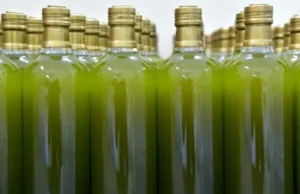“The high professionalism of the olive oil industry is part of that heritage of Italian creativity and genius represented by Made in Italy. It is to the skills and passion of these highly qualified figures, in fact, that we owe the success of extra virgin olive oil, in Italy and around the world”.
It supports it ASSITOL, the Italian association of the oil industry member of Confindustria and Federalimentare which, in a conference at the Ministry of Enterprise and Made in Italy launched the idea of a “moral” recognition of these professionals.
The meeting took place as part of the initiatives for the National Made in Italy Day, celebrated on April 15th of each year, the anniversary of Leonardo da Vinci’s birth. For Minister Adolfo Urso the professionals of the oil industry have created and donated a truly unique work: a special extra virgin olive oil, specifically designed on the institutional profile of the minister himself, called “Italian Mastery”, to symbolize the passion and expertise of the Italian masters of blending.

“This year – has explained Anna Cane, President of ASSITOL’s Olive Oil Group – instead of focusing on the products, we wanted to celebrate the professionals of the oil industry, highly specialized and often unknown to the general public, who are the beating heart of this sector”. Specifically, they are three figures to which, due to their role, the Association has given ample space: the raw material expert, the master of blending, the expert of new markets. “It deals with – he added – of figures born and developed over time by olive oil companies, which still today cultivate and train these talents directly. These professionals are just a few dozen in Italy, their training is specific and continuous, which adapts to the evolution of the market and consumption. Valorizing them means strengthening the supply chain and working for its future”.
Thanks to their skills and commitment, Today the oil industry is able to withstand the uncertainties of the economy and geopolitics. “The climate crisis of recent years has represented the heaviest unknown – Anna Cane underlines -. Italy, unfortunately, had to face the most difficult scenario also in the last campaign, which recorded 30% less olive oil. This created tensions on prices and reduced olive oil consumption by 10%”. And yet, despite everything, the sector employs, between direct and indirect employees, 15 thousand people, for a turnover of approximately 4 billion and an industrial production equal to one million tons, divided between the Italian market and exports.Europe remains the first outlet for our olive oil with the 75% of trade abroad, followed by the North America and then from theEast and Central Asia. The EU also represents 50% of oil consumption, thanks above all to Spain and Italy. However, the United States has landed on the podium of the strongest consumers in recent years, promising to become the world’s leading consumer by 2030.

The manager brought two different success stories: Brazil and Philippines: “They are two examples at opposite ends of the spectrum, centered on two food cultures that are totally different from ours”. However, these are very large markets: Brazil has a population of 211 million people, the Philippines 115 million. Another common factor, which makes it more difficult to propose olive oil in these countries, is that local consumers associate this product with Portugal and Spain, not with Italy. “To attract consumers, we immersed ourselves in their daily habits, looking for a link between their traditions and ours. It worked. By offering extra virgin olive oil with local dishes, a much-loved dish, we managed to reach the tables of Brazilians. In the Philippines, however, our crowbar was pesto, declined in different ways in their recipes. A work of research and adaptation that is certainly not immediate”.
Technical knowledge and artisan skills are instead the ingredients of the history of Marzia Migliorini, master of the Carapelli Firenze blend, who in a video showed how a figure like his works in practice. “My profession requires great passion and commitment, many skills, teamwork and continuous updating. The master blender combines oils from different cultivars and origins to create one with its own distinctive characteristics. However, for my role there is no academic path, I learned many things in the company”. After all, there are many skills needed to create a quality oil: in-depth organoleptic knowledge of oils, the sensitivity to recognize the different nuances of flavor and aroma, knowledge of the different varieties of olives and the olive tree, as well as the processing operations in the mill and the conservation of olive oil, and global consumption trends. In short, the master of the blend is a super expert. “Different cultivars and origins offer a great wealth of flavours and aromas: my job consists precisely in knowing how to interpret the different characteristics of oils to create products with unique profiles that respond to consumer preferences”.
To clarify what his work consists of Emanuele Zampetti, raw material expert and director of selections and purchasing at Costa d’oro, he defined himself “a diplomat of raw materials. Today, those who carry out my activity no longer deal only with the selection of raw materials and purchases, it has evolved, transforming into a role that requires a constant exchange of information and a great ability to anticipate market trends. I could define myself as an artisan market analyst: every day I collect and analyze data, trying to arrive first, taking advantage of my experience, intuition and direct knowledge developed over years of experience in the field”.
Another fundamental aspect of this professionalism is the building of relationships. “Human contact remains central: I know who supplies us with oil, I know who is behind each batch we select. Sustainability has profoundly changed our sector and my role. We no longer speak only of suppliers, but of real partners with whom we can build a common path, based on trust and shared values”.
Andrea Pontarelli, Dean of the Agricultural Institute “Giuseppe Garibaldi” in Rome, reiterated the importance of professionalizing school courses, in accordance with market trends. From this point of view, the Institute, the oldest in Italy, is an example to imitate: precision agriculture, tasting techniques, drones and marketing are fully part of the toolbox of the agricultural expert. “Even in technical institutes, training is often detached from the real world – underlines the school director – On the contrary, the school should be at the service of the productive world. The company is therefore jointly responsible for the training offer and is called upon to give precise indications on the needs of its labor market. The dialogue between school and companies must be institutionalized, it must become the basis of training choices”. Pontarelli explained how his school is moving: “We were the first in Italy to create an ad hoc course for the higher technician of the olive oil supply chain, a figure capable of designing and managing the processes in the mill. Now we are working on the training of technicians and managers for olive oil companies”.
The future, in short, is written at school. “We wanted to give a face and a voice to the professionals of the oil industry – observed Anna Cane – everyone has their own path, their own story, because they are special figures, unique in their kind. So far, companies have done everything on their own, but, in the future, there is a risk of losing fundamental skills for the sector, especially in an increasingly globalized world, in which the brain drain, even in the Italian oil industry, is starting to worry”. For this reason ASSITOL believes that olive oil should be more present in the programs of technical institutes and Made in Italy high schools.
“We ask Minister Urso and national institutions to recognize and enhance, through specific actions, these extraordinary professionals who, to all intents and purposes, do not limit themselves to creating Made in Italy, but to being an integral part of it. To this end, we are available to collaborate with everyone to support training projects capable of orienting and training future professionals in the oil industry”.
The conference concluded with a mutual commitment between the Association and the Agricultural Institute to launch a specific training project on the professionalism of the oil sector.


Dining and Cooking